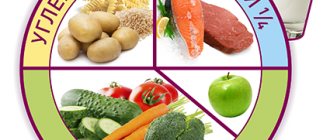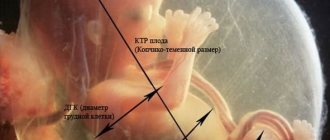Pregnancy often becomes a long-awaited gift for women. Now there are a lot of reasons for concern. Those who read pregnant forums have many questions that require explanation.
FAN decided to understand this difficult topic and find out what awaits women during this period, what the first trimester of pregnancy is, and how to avoid complications. We found out what is allowed and prohibited for women in the early stages of pregnancy. Doctor of Medical Sciences, obstetrician-gynecologist at the Taganka Women's Medical Center Fatima Margiani .
Recommendation 1: stop taking medications
The most important rule for women in the first trimester of pregnancy is to avoid taking medications. The medications you took before pregnancy cannot be used in the first trimester of gestation.
In the early stages of pregnancy, the formation of fetal organs occurs, and any drug can negatively affect this process.
Therefore, before you swallow a tablet, powder or syrup, think carefully and be sure to consult with your obstetrician-gynecologist. If you have any chronic disease that requires medication, you should also consult a specialist.
Pregnant uterus
In place of the mature follicle, a corpus luteum is formed; it produces estrogens and progesterone. Estrogens contribute to the thickening of the muscular layer of the uterus, the blood vessels dilate, and blood flow to the uterus increases.
Progesterone promotes enlargement of the uterus and reduces the activity of the uterine muscles. In the 1st trimester of pregnancy, the uterus increases to 8-12 cm.
Recommendation 2: Avoid strenuous physical activity
Is it possible to play sports in the first trimester? Not only is it possible, but it is necessary! Exercising during pregnancy is the key to excellent mood, good physical shape, normal weight, absence of constipation and swelling. In addition, sports allows you to prepare your body for the upcoming birth.
If before pregnancy you did Pilates, yoga, or swimming, then in the first trimester of gestation you don’t have to give up your favorite activities. But it’s not worth learning new sports. Unusual exercises and loads for the body can negatively affect the course of pregnancy.
Heavy physical activity is prohibited in both early and late stages of pregnancy. For example, you cannot jump into water from a tower, ride horses, or go rock climbing. If you were previously into running, then during pregnancy it is better to replace running with brisk walking.
Sources
- Williams R., Kothny W., Serban C., Lopez-Leon S., de Vries F., Schlienger R. Association between vildagliptin and risk of angioedema, foot ulcers, skin lesions, hepatic toxicity, and serious infections in patients with type 2 diabetes mellitus: A European multidatabase, noninterventional, postauthorization safety study. // Endocrinol Diabetes Metab - 2021 - Vol2 - N3 - p.e00084; PMID:31294090
- Aguirre-Romero AB., Galeano-Valle F., Conde-Montero E., Velázquez-Tarjuelo D., de-la-Cueva-Dobao P. Efficacy and safety of a rosehip seed oil extract in the prevention and treatment of skin lesions in the hands of patients with type 1 diabetes mellitus caused by finger prick blood glucose monitoring; a randomized, open-label, controlled clinical trial. // Endocrinol Diabetes Nutr - 2021 - Vol67 - N3 - p.186-193; PMID:31235400
- Saito H., Ebashi M., Kushimoto M., Ikeda J., Egashira F., Yamaguchi S., Watanabe K., Ogawa K., Suzuki Y., Ishihara H., Fujishiro M. Elsberg syndrome related to varicella zoster virus infection with painless skin lesions in an elderly woman with poorly controlled type 2 diabetes mellitus. // Ther Clin Risk Manag - 2021 - Vol14 - NNULL - p.1951-1954; PMID:30349274
- Shenavandeh S., Anushiravani A., Nazarinia M.A. Diabetic muscle infarction and diabetic dermopathy two manifestations of uncontrolled prolong diabetes mellitus presenting with severe leg pain and leg skin lesions. // J Diabetes Metab Disord - 2014 - Vol13 - N1 - p.38; PMID:24559137
Recommendation 3: Avoid long flights
Perhaps in the first trimester of pregnancy you will want to go on vacation to distant countries. For example, to Cuba, Sri Lanka, Tanzania. Vacations in exotic countries are of course good, but your health and the safety of your unborn baby should come first!
During a flight, there is a very large pressure drop, and how your body will bear this load is anyone’s guess. It is likely that everything will go fine, but some problems are possible:
- exacerbation of toxicosis;
- frequent urge to urinate;
- increased fatigue;
- problems with the digestive system;
- dizziness.
In addition, during a long flight you will be constantly sitting. And prolonged sitting can lead to lymphostasis - swelling of the soft tissues. In this regard, it is quite reasonable to replace long flights with shorter travel routes.
Before your flight, be sure to go to an appointment with an obstetrician-gynecologist, who will assess your condition and accurately answer the question: can you fly or not. If you have certain health problems, flying is contraindicated for pregnant women. For example, air travel is prohibited if you have severe anemia.
When going on holiday abroad, do not forget that in many countries in Europe and Asia there is a risk of contracting measles and rubella. And if you did not have measles or rubella as a child or did not complete the full course of vaccination against them, then if you become infected, you will face serious troubles. For example, infection with rubella in the first trimester increases the risk of miscarriage by 4 times.
Recommendation 4: exclude spicy, salty, raw foods from your diet
The importance of proper nutrition in early gestation cannot be overemphasized. The growth and development of your unborn baby largely depends on how you eat. And there are a number of foods that pregnant women should avoid. These include:
- Spicy, salty, smoked foods that put a lot of stress on the liver and kidneys. During pregnancy, these organs already have a hard time. The liver experiences double load due to hormonal changes. In the kidneys in the first trimester, blood flow increases and glomerular filtration increases. Therefore, you should not additionally burden the liver and kidneys with poor nutrition.
- Blue cheese, raw eggs, meat; fish. These products may contain pathogenic bacteria. For the same reason, you should not consume raw milk. Even if you buy milk from a trusted store, it is better to boil it before use.
- Carbonated drinks, which negatively affect the functioning of the intestines, kidneys, and gallbladder, cause bloating and stool upset.
- Coffee. The allowed limit is one cup of coffee per day. Drinking more coffee can increase the muscle tone of the uterus and cause miscarriage.
- Alcohol. Drinking alcohol during pregnancy leads to oxygen starvation of the fetus, delaying its growth and development. Just 3-4 small doses of alcohol can cause alcohol syndrome in the fetus, leading to serious mental and physical abnormalities.
First trimester - stages of child development
At the moment when the embryo appears, it is already two weeks old, since the obstetric period is counted from the first day of the last menstruation. The true term begins to count immediately after pregnancy.
The end of the second - the beginning of the third week of pregnancy. At this stage, the chromosome set of the unborn child is formed, which determines eye color, gender and other characteristics. Next comes the period of implantation, when the embryo is implanted into the uterus.
Week 4. The size of the baby is a small grain. At this stage, the laying of the baby’s organs and tissues occurs.
Week 5. Size – 3-4 mm. At this stage, the formation of the neural tube occurs. Folic acid is necessary for the normal formation of the neural tube, so pregnant women are recommended to consume this vitamin.
Week 6. Size – 5-7 mm. The formation of the intestines begins, the rudiments of arms and legs appear.
Week 7. Size – 1.3 cm. Interdigital spaces appear, arms and legs continue to form, ears and nose appear.
Week 8. Size – 1.6 mm. Facial features and internal organs are actively formed, fingers and eyelids appear, the brain is divided into three parts.
Week 9. Size – 2.3 cm. The rudiments of the tongue and teeth appear, the neck is visible, the wrist and ankle joints are formed, the diaphragm is formed, and the heart valves are formed. The circulatory and reproductive systems develop.
Week 10 Size - 3 cm. The skull is actively growing, the stomach and intestines produce digestive juices, the liver produces bile, the pancreas produces insulin, the genitals take on a shape characteristic of the sex. The sucking reflex develops.
Week 11 Size - 4 cm. The growth of medulla cells, the differentiation of the central and peripheral nervous systems occurs, the grasping reflex develops, the heart completes its development, the liver grows.
Week 12. Size – 5.3 cm. Active development of the brain, the beginning of the production of hormones by the pituitary gland, red bone marrow produces white blood cells, kidneys produce urine.
Recommendation 5: Do not wear tight clothes and shoes
In the first trimester of pregnancy, a woman's silhouette changes slightly. Because of this, many pregnant women continue to wear tight-fitting clothes to highlight their figure. However, even in the early stages of pregnancy, it is better to choose loose clothing that does not compress soft tissues, the abdominal area, and mammary glands. Wearing tight clothes can impair blood circulation, lead to lymph stagnation, cause fatigue, and increase the unpleasant symptoms of toxicosis.
What kind of shoes should pregnant women wear? Choose comfortable shoes with solid soles. During pregnancy, the center of gravity gradually changes, and when wearing shoes with heels, the load on the lumbosacral region increases.
If we talk about the cold season, it is better to replace shoes and boots that are very tight on the calf muscles or feet with looser shoes. As with clothing, this will help avoid poor circulation and lymph stagnation.
Visit doctor
When to register.
Early registration – up to 12 weeks. But a woman may appear later, but a late statement can lead to undesirable consequences, so you should not delay it.
What tests to take.
When registering, the following tests are required: vaginal smears, syphilis, HIV, hepatitis, infectious diseases that can be transmitted to the fetus. Additional tests: hormones, urine culture, amniocentesis.
The Ministry of Health recommends taking the following tests: microbiological examination of urine, blood group and Rh factor, CBC, coagulogram, thyroid-stimulating hormone, OAM, smear from the surface of the cervix and cervical canal.
Recommendation 6: avoid hypothermia and overheating of the body
If before pregnancy you liked to take a steam bath or, conversely, plunge into an ice hole, then during pregnancy you need to reconsider your habits. Overheating and hypothermia are dangerous for the fetus, especially in the first trimester of gestation.
Hypothermia impairs blood circulation, which can cause fetal hypoxia. Also, do not forget that during pregnancy, immunity decreases, which means the risk of colds increases.
Overheating of the body in the early stages of pregnancy negatively affects the formation of the fetus and increases the risk of miscarriage. Therefore, in the first trimester of gestation it is better to avoid baths and saunas. In the second and third trimester, if there are no contraindications, you can visit the sauna and bathhouse.
Recommendation 7: Do not use hair and nail dyes with toxic substances
Of course, even during the period of bearing a child, every woman wants to remain beautiful. Therefore, pregnant women often have a question: is it possible to dye your hair and get a manicure during pregnancy?
You can dye your hair during pregnancy, but you need to choose gentle organic dyes made from natural ingredients. Inorganic paints contain ammonia and other harmful substances that can cause allergies in a pregnant woman and increase symptoms of toxicosis.
The situation with manicure is more complicated. A manicure always begins with removing old nail polish. Remove varnish with acetone and other substances that have a very strong odor. This can cause an allergic reaction in you, even if you were not allergic to acetone before pregnancy. The thing is that during pregnancy, immunity decreases, which means the likelihood of allergic reactions increases. If you still decide to go to the salon for a manicure, then ask the master for a mask that will protect the respiratory tract from harmful substances.
For manicure, you should also choose gentle varnishes that do not contain toxic substances - phosphoric acids, acetone alcohols, formaldehyde.
Recommendation 8: Accept your pregnancy and your new role as “I am a mother”
In the first trimester of pregnancy, hormonal changes occur in the female body, which affects the functioning of the nervous system. In this regard, a pregnant woman may experience conditions and emotions such as tearfulness, anxiety, and excessive sensitivity. And some pregnant women even feel guilty before others for their whims over trifles, frequent emotional breakdowns.
Feelings of guilt are a negative attitude that must be gotten rid of. After all, such an emotion will cause you psychological discomfort.
Irritability in the early stages of pregnancy is nothing more than an attempt by the female psyche to fully realize and accept the fact of motherhood. And the sooner you accept your pregnancy and your new role as a mother, the sooner your calmness, good mood will return, and you will stop feeling guilty before others.
Is there a risk of miscarriage?
As Dr. Margiani told us in an interview, the risk of miscarriage depends entirely on the woman’s health. Moreover, there are quite a lot of reasons for terminating a pregnancy or miscarriage:
- presence of chromosomal disorders;
- thrombophilia;
- disorders in the endocrine system;
- infections;
- exposure to harmful environmental factors;
- frequent stress;
- improper functioning of the immune system.
All these factors confirm the need for a comprehensive examination of a woman.
“Probably, the first two weeks can be considered the most dangerous, since the woman does not yet know that she is pregnant, and can continue to take some medications, vitamins, train hard and do complex exercises, go to the solarium, and so on,” the expert noted. “Having learned that pregnancy has occurred, a woman should go to a specialist and get the necessary recommendations.”










